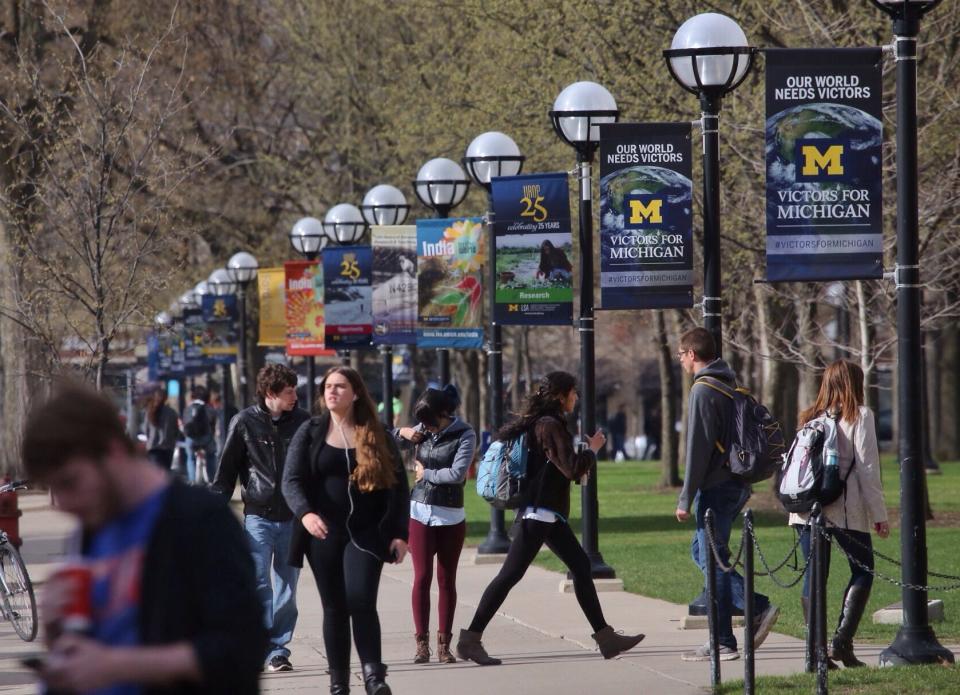University of Michigan's campus firearm ban upheld by Court of Appeals
The University of Michigan’s ban on carrying firearms on its campus does not violate the Second Amendment a two-judge state Court of Appeals panel ruled Thursday.
In Wade v. University of Michigan, Court of Appeals Judges Mark Cavanagh and Deborah Servitto ruled 2-0 in favor of the Ann Arbor school, writing that despite the Second Amendment giving citizens the right to bear arms, universities are considered “sensitive places” where firearms possession can be regulated by governing bodies — in this case, U-M.
In their opinion, Cavanagh and Servitto wrote that U-M’s policy “is constitutionally permissible because laws forbidding the carrying of firearms in sensitive places are consistent with the Second Amendment.”
U-M's policy for weapons on campus states "possession of firearms, dangerous weapons and knives (longer than 4 inches) is not permitted on property owned, leased or otherwise controlled by the University of Michigan, even if you have a concealed weapons permit."
Joshua Wade, an Ann Arbor resident, sued the university in 2015 for banning him and others from being allowed to openly carry on campus, according to a Free Press report. He applied for a waiver from U-M’s Department of Public Safety but was denied.

Wade’s initial lawsuit was dismissed by the Michigan Court of Claims, prompting an appeal. The COA first weighed in on Wade back in 2017, ruling 2-1 in favor of U-M’s gun ban. Wade, through attorneys, appealed the COA decision up to the Michigan Supreme Court.
Free Press investigations: DOJ, others investigating Michigan school district over use of seclusion and restraint
The Supreme Court agreed to take up the case in 2020, but eventually remanded, or sent back, the case to the COA following the U.S. Supreme Court decision in Bruen v. New York. In Bruen, decided in 2022, SCOTUS ruled 6-3 that New York state’s policy requiring residents to have a special need to carry a firearm outside their homes was unconstitutional.
After the Bruen decision, the court sent the case back to the COA, where Cavanagh and Servitto ruled again in favor of U-M, despite noting "that plaintiff’s conduct is presumptively protected by the Second Amendment" under Bruen's framework.
"However, because the university is a school, and thus a sensitive place, it is up to the policy-maker — the University in this case — to determine how to address that public safety concern," judges wrote.
In the initial COA decision in 2017, Judge David Sawyer dissented from the majority opinion, writing that U-M should not be able to preempt Michigan’s gun laws. Sawyer, however, retired last year and was not part of the ruling panel the second time it took up Wade.
A U-M spokesperson said the school is “heartened to learn that the state Court of Appeals has, once again, upheld the University of Michigan's policy that bars weapons from our campuses, with some limited exceptions.”
Asked whether another appeal to the Michigan Supreme Court is possible, Wade's attorney, Steven Dulan, said he and his client are still discussing next steps.
"It's a respectful disagreement, but we are truly disappointed and we do still disagree with the definitions involved with sensitive place and schools specifically," Dulan told the Free Press.
Contact Arpan Lobo: alobo@freepress.com. Follow him on Twitter @arpanlobo.
This article originally appeared on Detroit Free Press: University of Michigan firearms ban affirmed by Court of Appeals panel

